Gardening programs support Black seniors in Sacramento
The story was co-published with the Sacramento Observer as part of the 2024 Ethnic Media Collaborative, Healing California.
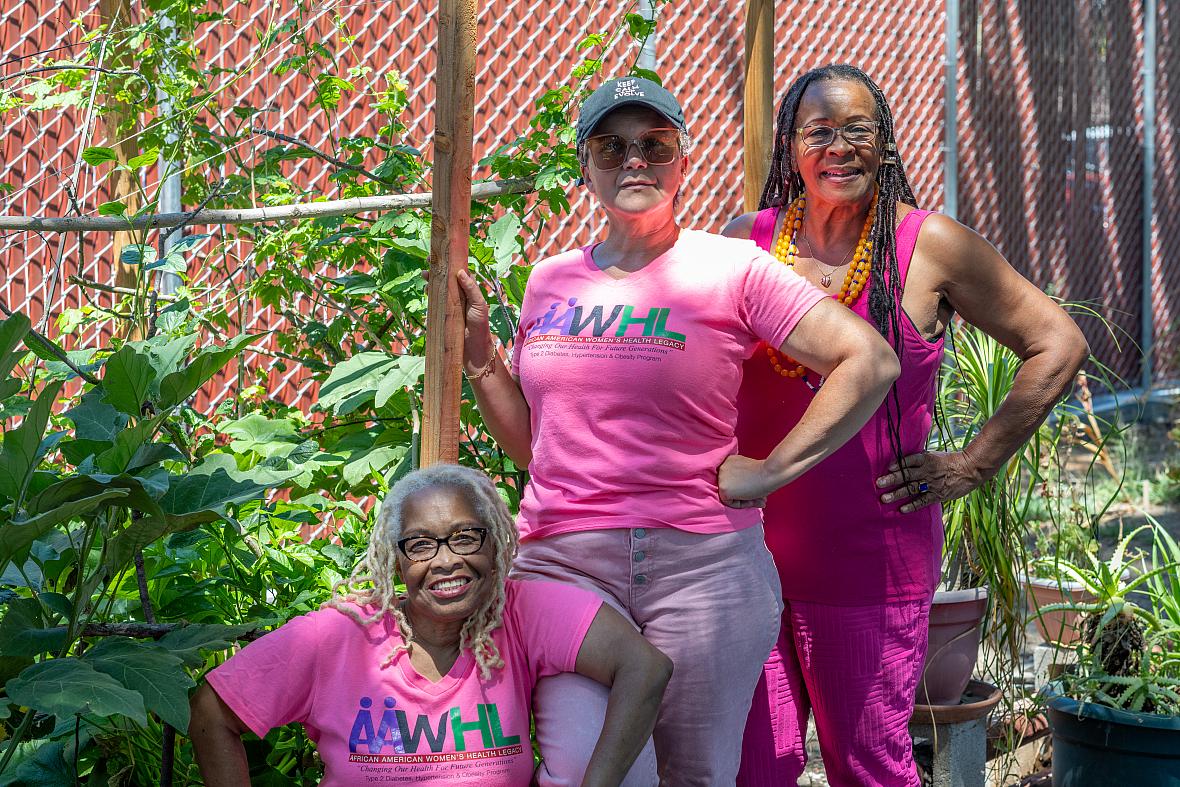
Sharon Chandler, left, Deanna Vestal, center, and Yemanya Napue, right, of the African American Women’s Health Legacy program, aid participants in maintaining their gardens and offer educational experiences that encourage healthy eating habits among older adults.
Russell C. Stiger
Lifelong planter Sharon Chandler grew up in Missouri, helping her grandmother, Helen Bundy, tend their home garden. Those early lessons have sustained Chandler throughout her life.
“It was those times when we were in the garden and she was showing me different insects and bugs that are good for the plants and those that are not. Telling me ways to compost and put our scraps into the dirt and how that regenerates the dirt, fertilizes the dirt, but also provides other things,” recalls Chandler, 61.
Grandma Bundy was planting seeds for the future.
“She didn’t know it was the ecosystem, but it provides the ecosystem for birds and worms and farther on up the chain. Everything benefits from what comes out of our dirt, out of the ground,” said Chandler, who now has grandchildren of her own.
Today, Chandler is introducing other seniors to the love of gardening in an effort to positively impact their physical and mental well-being, and foster social connection. For the last two years she’s offered a Senior Mini Patio Gardening Program to residents of the Delta Cove senior apartment complex in South Sacramento. It’s run through her African American Women’s Health Legacy (AAWHL) program, an offering of her non-profit organization, Yes2Kollege, that empowers and educates women and girls to take control and better manage their chronic diseases through self-management, healthy eating and active living.
The Agency On Aging Area 4 has a similar Edible Garden Program, serving seniors in and around the greater Sacramento region. Both are funded through CalFresh’s Healthy Living Program. The Senior Mini Patio Gardening Program is funded through the project at UC Davis.
Chandler was inspired to focus on seniors by her mother, Shirley Turner. Before she passed away earlier this year, Turner often visited Chandler’s home and helped with her daughter’s bounty. “We would harvest and wash up the vegetables and bag them up for the freezer or for people to take, she said.”
Living in an apartment, Turner missed being able to do that. “I started her little garden in her backyard,” Chandler said. “I saw there were other seniors who had all kinds of flowers and plants and things, maybe a herb here and there, but I didn’t see anyone growing real vegetables. I thought we could take this program to seniors, who are so isolated, and a lot of them are sick. Some have said, ‘I’m just sitting here waiting to die.’”
Growing strong
According to California’s Master Plan On Aging, 22% of the Population in Sacramento was aged 60 or older in 2022. Blacks made up 8% of that group. The number of Black seniors is growing rapidly, due in part to the aging of the Baby Boomer generation, as well as to the fact that Black people are living longer than ever before. In addition to the aches and pains that generally come with growing older, many seniors were hit hard by the coronavirus pandemic, and post-COVID research has shown rises in depression and feelings of isolation.
In the wake of the pandemic, the California Department of Public Health granted $3.9 million to the nonprofit LeadingAge California to bring seniors therapeutic sensory gardens and horticultural classes at 75 skilled nursing facilities through Eldergrow, an organization that brings nature inside for older people.
LeadingAge California’s GARDEN (Garden Access Responds to Diagnosis and Environmental Needs) Project aims to “reduce resident loneliness, provide a meaningful and productive therapeutic activity, reduce depression, stimulate cognitive activity, and encourage motor skills.” The three-year project seeks to directly address social isolation and loneliness caused by COVID-19.
Studies have shown that gardening can have a number of health and social benefits for seniors. It can potentially decrease the risk of dementia, enhance cognition, reduce stress, and boost immunity. It also provides direct access to healthy foods and opportunities for much-needed physical activity. The Mayo Clinic Health System also credits gardening with the potential to improve one’s balance, strength and flexibility.
In 2023, residents of the Delta Cove Apartments received garden starter kits, or grow bags, and the infrastructure to maintain them. Although the summer heat has been brutal on their plants this year, participants are still proud of their small patches and the benefits they’ve yielded.
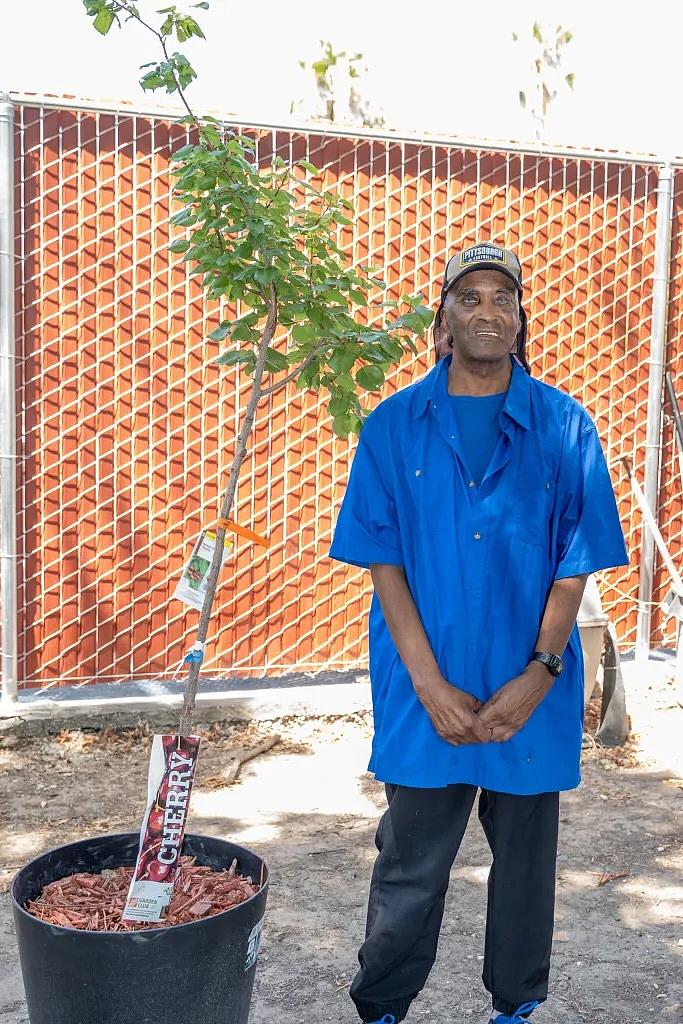
David King, 69, can’t see much of his garden, but that hasn’t stopped him.
Russell C. Stiger
David King, 69, can’t see much of his garden, but that hasn’t stopped him. “I’m out there every day, but there are some things I can’t see,” King said.
A major car accident in 1977 left him with damage to his eyes. He has a plastic left eye and has only 25% vision in his right one. King has had multiple surgeries and is excited that another one, scheduled in a month, will use new technology to improve his vision.
King was bit by the gardening bug while living at Phoenix Park, another local affordable living complex. At Delta Cove, he planted a cherry tree and a raspberry bush he purchased and has tended to along with watermelon, cantaloupe and cucumbers. The senior has a knack for landscaping, which he cultivated in his former job working for a local homeowners association. His display of artificial birds and plants rivals that of aviaries people pay to see. He also gets requests from his neighbors on occasion to transform their spaces.
Transforming what he eats has been essential to King. “I don’t eat a lot of red meat,” he said. “I love salad and vegetables. I love broccoli, cabbage and cauliflower. It’s healthy and it doesn’t taste bad.”
King is concerned about the habits and health outcomes for younger generations. Even with impaired vision, he noticed a difference while working as a crossing guard at a nearby elementary school. “When I used to work the cars, I’d see these little kids in fourth and fifth grade, weighing 200 pounds.”
He blames parents for not providing fresher meals and schools for a decreased focus on nutrition and exercise.
Black health matters
Education has been a key component of AAWHL’s programming since its 2005 inception, when Chandler and co-founders Toni Colley-Perry and Cloteal Herron decided to tackle the problem of diabetes in the Black community. According to the CDC, 15% of African Americans in Sacramento County have been diagnosed with diabetes.
“We started learning everything we could about diabetes and how it devastates African American families,” Chandler said.
They focused on women, as they’re largely responsible for shopping and cooking for their families. In talking to these women and hosting focus groups at area community centers, they discovered that “everybody had had a story about a garden.”
To date, 30 seniors, female and male, have been served by the pilot gardening program and the AAWHL team is looking to expand to other senior complexes.
“A lot of them are trying new things,” Chandler said of participants. “It’s surprising to me that some people are 80 years old and they've never had a zucchini before. They’ll tell me, ‘I’ve never eaten eggplant before.’ I say, ‘OK, well, let’s grow eggplant and then we’ll worry about how we’re going to eat it later,’ and then we'll get some recipes on how to cook it and we’ll do some taste testing.”
In addition to food demos, seniors will soon be offered field trips to local farmer’s markets. Some have never been.
“There’s a farmer’s market almost every day of the week here around Sacramento,” Chandler said.
One such market operates close to Delta Cove in the parking lot of the Florin Light Rail Station on Saturdays and Sundays, having moved recently from its previous location outside the Florin Towne Center. AAWHL team educates senior participants on limited incomes on how they can use their EBT cards and a Market Match program to stretch their food budgets.
“You get to double your food. Sometimes they even have where you get triple it, if they’re doing a special (offer).” Chandler said. “We’re going to take them there and let them see what a farmer’s market is about and let them see how their food can multiply.”
Chandler is proud to help seniors take a small bite out of food insecurity. According to the National Council on Aging, roughly 7 million older Americans, or 1 in 11 ages 60 and older, faced food insecurity, or limited access to adequate food, in 2022.
“They’re not growing a crop,” Chandler said. “It won’t provide for the whole summer, or the whole family, but if you go out there occasionally and you can get two or three tomatoes off your plant, that’s a meal. That’s one or two meals that you don’t have to buy from somewhere.”
Chandler is also happy to practice what she preaches. She maintains Swiss chard in her own backyard, has four nectarine trees, and successfully grew corn recently with Napue’s assistance. The awe of it all never gets old for her. “I remember thinking, ‘I grew this with my own hands’.”
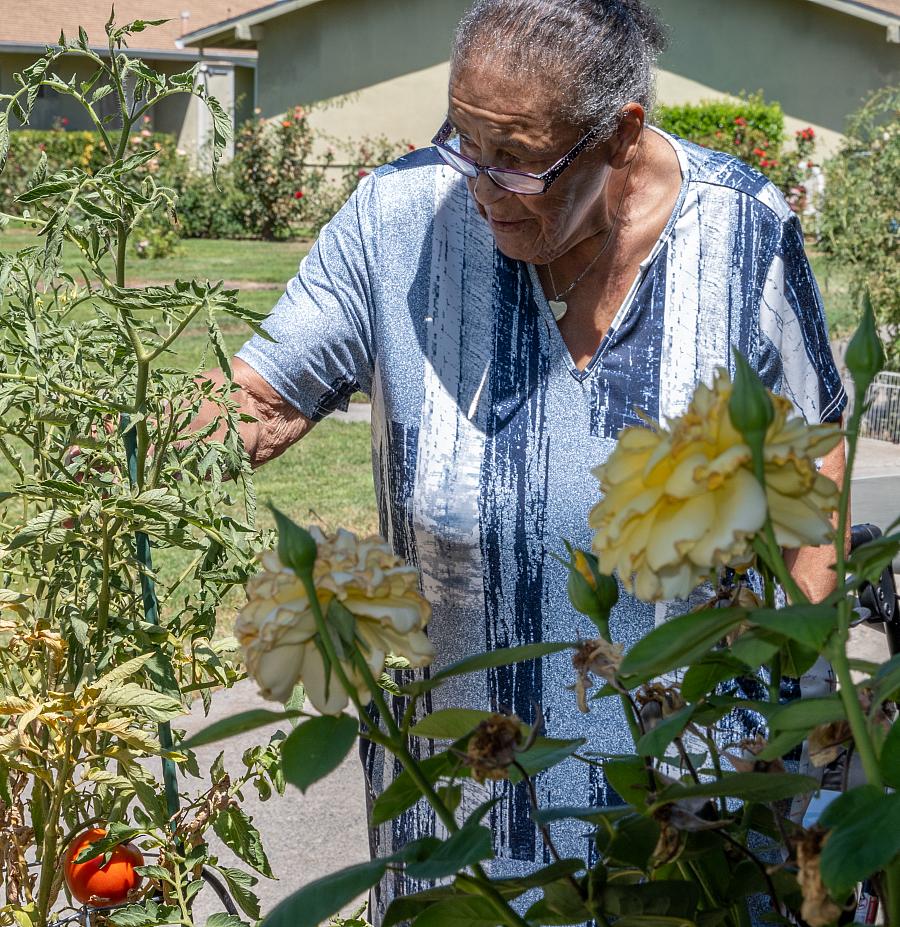
Joyce Seberry, 78, tends to her plants, despite the summer heat.
Russell C. Stiger
Joyce Seberry, 78, tends her garden at Delta Cove while seated in a walker. Seberry chose to grow rosemary and tomatoes. The rosemary’s still going strong, but there are no tomatoes on the vine now, victims of triple-digit heat. “I used to garden with my dad, he had a big garden,” Seberry said. “It’s relaxing to me. I like to see where it’s coming in and that what I’m doing is turning into fruit and everything.”
Her immediate neighbor, Sandy Davis, 82, also “grew up in the garden.”
“In the 1940s, everybody had a garden,” said Davis, a native of Richmond. “A lot of the kids from back in the ’40s ended up living a long time because we had greens every day. Not a day went by that you didn’t have mustards and collard greens to eat.”
Stating his preference for kale and collards prompted a discussion with Seberry on the difference between flat and curly mustard greens. “Most people can deal with the flat, because it kind of reminds you of the collards,” she said. “But that curly one, even I won’t eat that one. Give me a flat mustard, and I'm good to go.”
Conversations like these make Chandler smile. Seniors are talking about everything from the lack of bees needed to pollinate certain plants to the impact of climate change. And there’s no shortage of bragging about their successful children, grandchildren, and great-grandchildren.
“It’s gotten them to come out of their apartments,” Chandler said. “You’ll see four or five of them along a row of apartments and they’ll be out watering their plants at the same time. Then they’ll sit and have coffee and then they’ll sit and talk, and they’ll share the veggies that come up.”
Gardening is more popular than Bingo offered by Delta Cove staffers. “Now they’re helping each other,” Chandler said. “If a person is sick or goes into the hospital, or if they’re out of town, somebody will come and water their garden for them. They check on each other. It’s just really building community. They’re not living in a silo anymore, isolated. A lot of them don’t have families or anybody. Now they have the family of their neighbors.”
Daily essentials
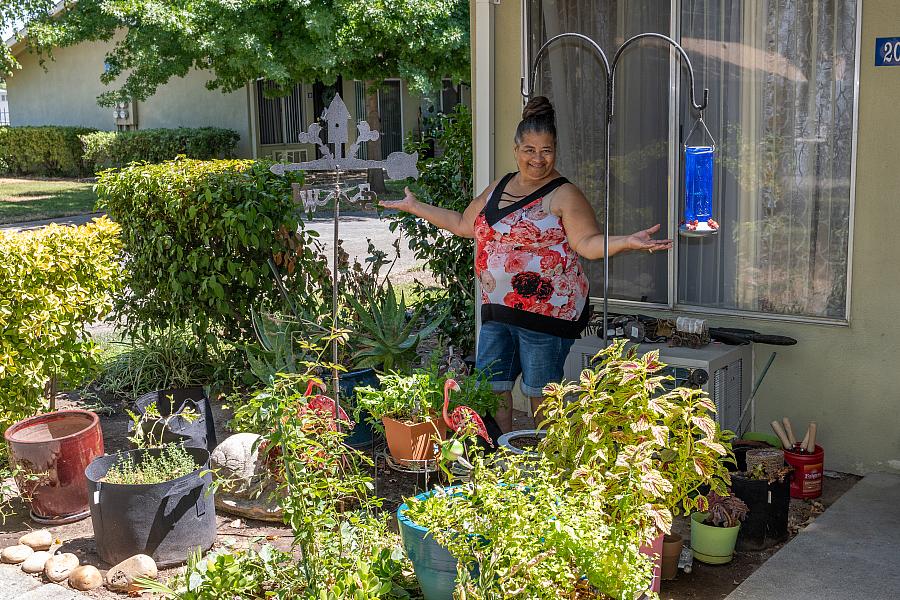
Pauline Daniels shows off the fruits, and vegetables, of her labor. Daniels, 70, is among locals participating in a Senior Mini Patio Gardening Program at her affordable living complex.
Russell C. Stiger
Pauline Daniels’ front yard garden boasts mint, basil, and coleus, an inedible plant identifiable by its beautiful green and red leaves. Daniels, 70, has also grown two small, round watermelons. A first-time gardener, she’s sold on the health benefits of working fruits and veggies into her daily routine. She’s currently feeling better due to her “obsession” with infused water.
“It’s nourishing for my body to do the mint and the cucumbers and the lemons,” Daniels said. “It’s so soothing to me when I drink it.”
She’s been enjoying infused water since her grandson told her about consuming cucumbers to stay hydrated. “I can’t get away from it and now I’m buying cucumbers all the time,” Daniels said.
The mint she uses in her drinks doesn’t have to be purchased, because it’s still growing strong right in her front yard.
Similarly, the program’s master gardener, Yemanya Napue, 68, has been following a popular watermelon water diet. Napue drinks two quarts a day and says it has helped her lose weight and feel better.
Napue is also carrying on the traditions of her ancestors, who have farmed for centuries in Nicodemus, Kansas. She came to appreciate nature and growing things from an early age, soaking up elder wisdom like a plant soaks up sun and water.
“I didn’t realize what all I had (learned) until I moved to California and saw all this land where no one was doing anything but mowing grass,” Napue said. “I was like, ‘What about the food?’ Everybody was buying everything from the grocery store. No one was growing anything.”
Having moved to Sacramento just before turning 10, Napue returned “down South” to spend holidays and summers with her grandparents. There, she learned how to quilt and create art from corn husks and dolls from corn silk.
Locally, the area senior has had a hand — literally — in the creation of countless community gardens throughout the Sacramento area.
“I’ve been a seed gatherer since I was a little kid,” Napue said. “If I have a really good peach, nectarine, or plum that is really good and sweet, I keep that seed because then all I have to do is put it in a pot with some soil and start to water it. I don’t have to do anything, but make sure it's getting the water that it needs and it has sun and it’ll come up.”
Orlando Truitt, 70, fell in love with plants and the changing of the seasons on his grandfather’s farm in Georgia.
“I was helping on the farm picking cotton and planting watermelons,” Truitt recalls.
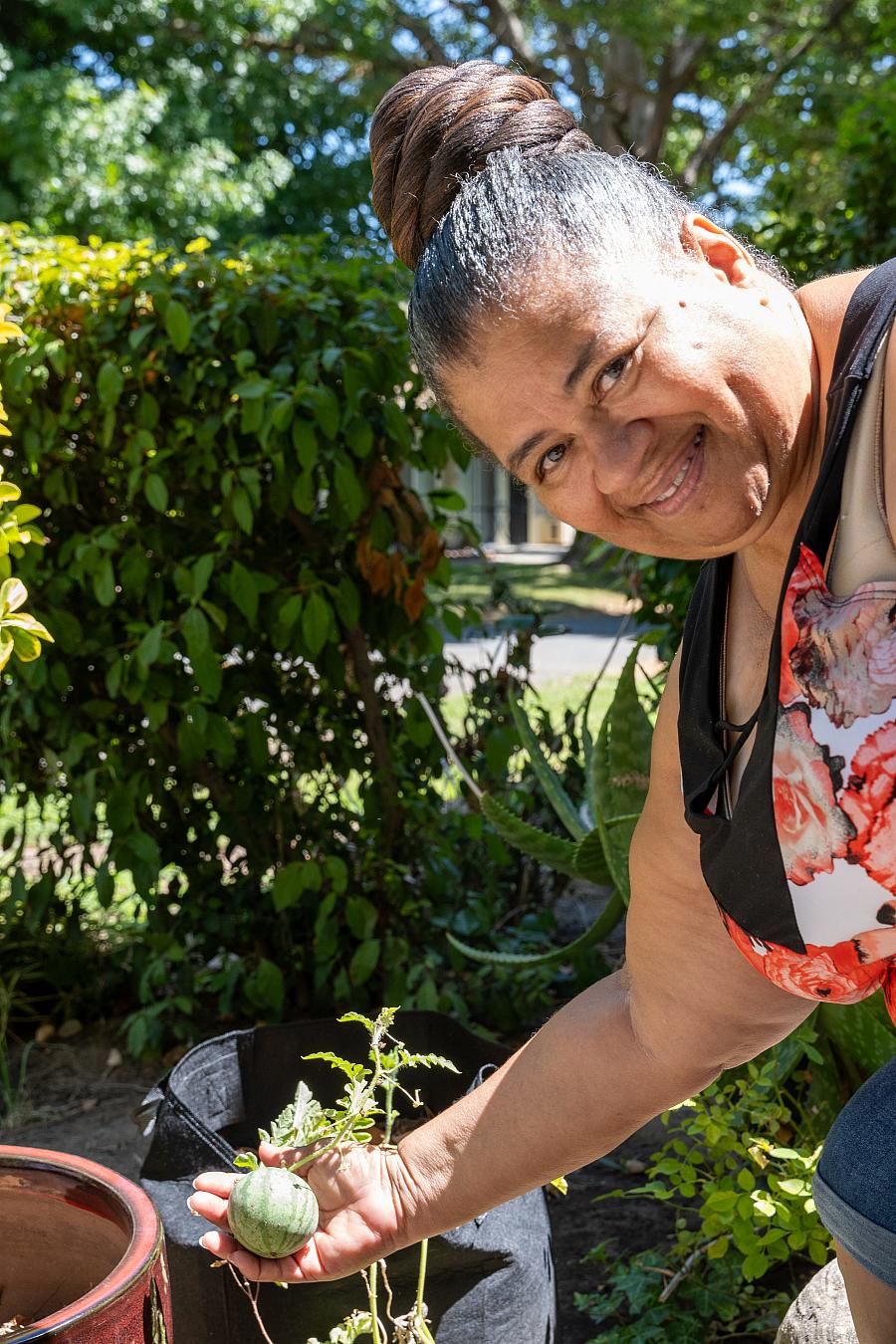
Small, round watermelons grow in front of Pauline Daniels’ apartment.
Russell C. Stiger
He doesn’t go as far as some of his neighbors, who talk to their plants to get them to grow to their full potential, but his tomatoes, squash, and chili peppers are doing well. His wife uses them in some of his favorite Vietnamese and Mexican dishes. He even spices up catfish with the peppers. Truitt considers himself blessed to be at the complex after experiencing a period of homelessness.
‘Soiled’ history
Older African Americans have plenty of stories of triumphing over adversity. Many of those stories involve toiling in soil. Napue’s farming family was among many Blacks in rural Kansas who faced generations of discrimination. The federal government finally promised financial compensation in 2022. Because she’s a descendant, Napue is paid to do organic gardening, which she officially teaches now that she has certification.
Many African Americans have distanced themselves from agricultural pursuits, big or small. Chandler and Napue want to see more folks returning to their roots and growing things with their own hands.
“We were mostly farmers, but over the years we’ve kind of lost that,” Chandler said. “It doesn’t look cool to be in the dirt, because that's what we did as slaves,” she continued. “That’s not just our legacy of being slaves, it’s also the legacy of our families surviving.”
EDITOR’S NOTE: This article is a part of OBSERVER Senior Staff Writer Genoa Barrow’s special series, “Senior Moments: Aging While Black.” The series is being supported by the USC Annenberg Center for Health Journalism and is part of “Healing California,” a 2024 reporting Ethnic Media Collaborative venture with print, online, and broadcast outlets across California.

